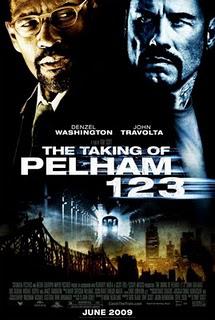 Tony Scott's remake lacks any and all suspense (as do nearly all his movies despite his penchant for thrillers), but he also finds a surprising resonance in the material. Blessed with a superbly written script, Scott tones down his usual madness and lets his actors do most of the work. Oh, he still can't help himself at times, but Scott puts his talents toward a sense of visual pacing and structure that uses the battle of wits between Garber (Denzel Washington) and Ryder (John Travolta) to slyly bring out back story and sociopolitical themes.
Tony Scott's remake lacks any and all suspense (as do nearly all his movies despite his penchant for thrillers), but he also finds a surprising resonance in the material. Blessed with a superbly written script, Scott tones down his usual madness and lets his actors do most of the work. Oh, he still can't help himself at times, but Scott puts his talents toward a sense of visual pacing and structure that uses the battle of wits between Garber (Denzel Washington) and Ryder (John Travolta) to slyly bring out back story and sociopolitical themes.Travolta hams it up to no end, playing ex-con stock trader Ryder like the demon of Wall Street unleashed below the city, his outrage at serving time for his white collar crimes well-timed to the outrageous entitlement displayed by the real stock brokers who took all kinds of shortcuts to make a fast buck. Garber too is guilty, but we see the disparity between them, greed motivating one and financial desperation the other. Washington and Travolta have the awkward task of playing off each other mainly through long-distance radio communication (an analog take on the potential for meaningful friendships through Internet communication?), but they make for one of the richest hero-villain pairs in years and get across some unexpectedly keen social commentary to boot, even if Travolta oversells it. Supporting players John Turturro (as an arrogant negotiator), James Gandolfini (a scandal-ridden mayor) and Luis Guzman (a former MTA employee nervously helping Ryder) also deliver solid performances.
Scott frames his film with flattened compositions, a beautiful array of neon-lit streaks of blue, red and green, and Scott's "Big Board" fetish realized by the flashing subway map back at Rail Control (a board framed, like all of Scott's giant screens, as a means of both clarifying and abstracting action). Yet despite his usual touches of altered speeds and on-screen text, Scott's aforementioned ease off the throttle shows that his love of visual style does not blind him to seeing and focusing on the great chemistry between Washington and Travolta. In fact, as a movie about a sedentary narrative spruced up by slick, action-oriented direction, I found The Taking of Pelham 1 2 3 to be not only more tasteful but more emotionally affecting than Danny Boyle's slick con job 127 Hours.

Sidenote: I don't know if Travolta decided to play Ryder as a flagrant homosexual or that's how the part was written, but if and when he ever comes out of the closet, expect this movie to be gutted for clips on late-night shows. Dressed like he just came from a gay bar, Travolta finds ways to be even more suggestive. Describing a teenage hostage to Garber, Ryder notes his outfit and tangentially throws in "he makes it work" before getting back to the threats. Talking with one of his cohorts about Garber, Ryder bypasses the fact he doesn't know what the man looks like and says, "He's got a good voice, though; he'll be my bitch in prison." Bless his heart; he seems to know he'll never be a star again and at least balances out his usual tat with unorthodox performances in this and Hairspray.

